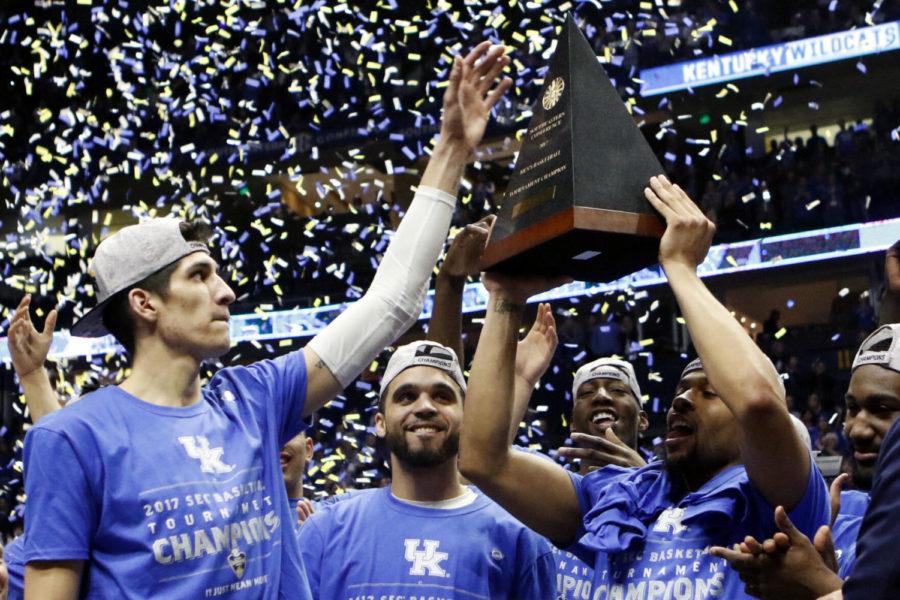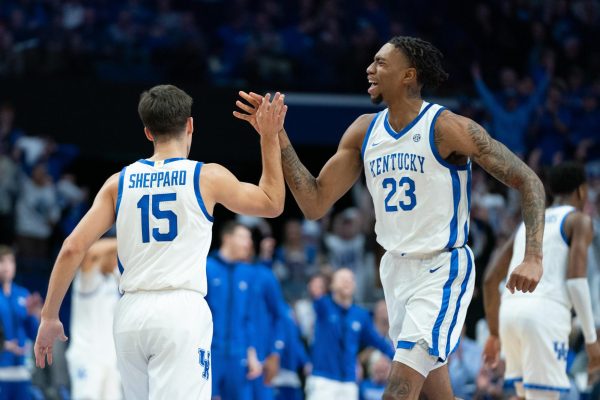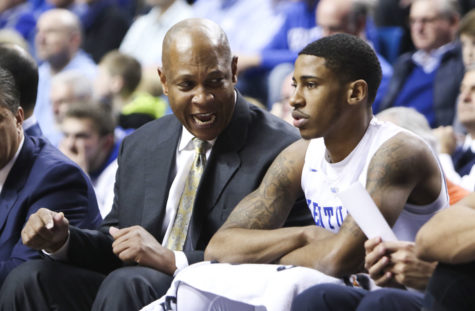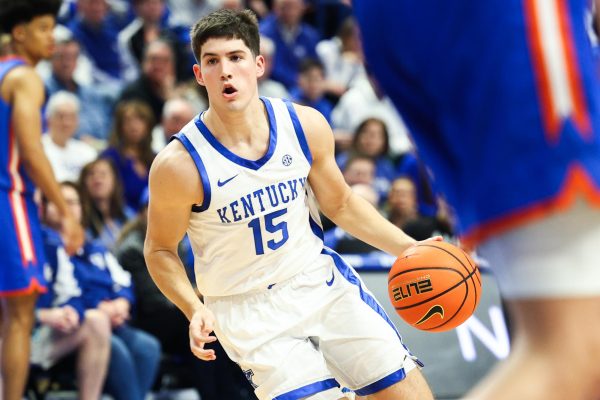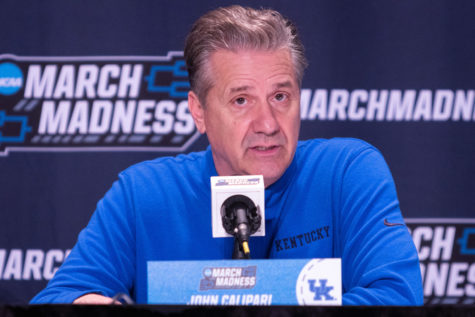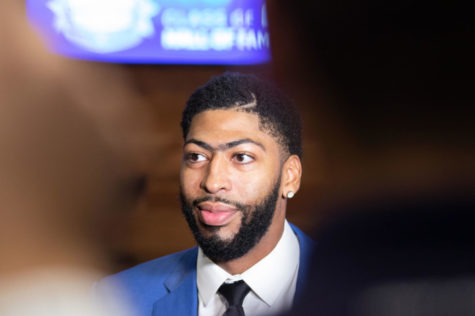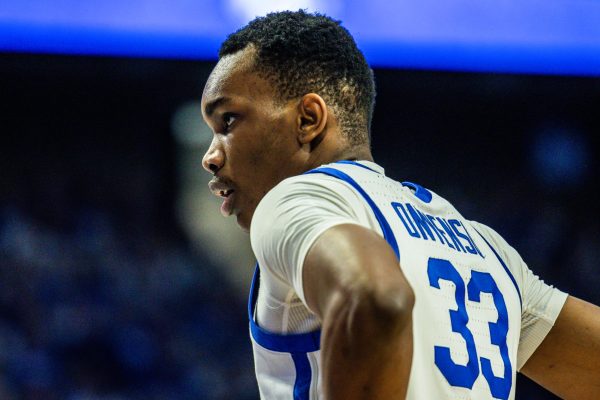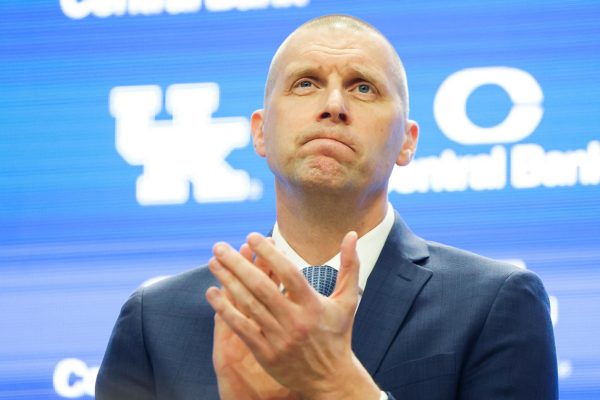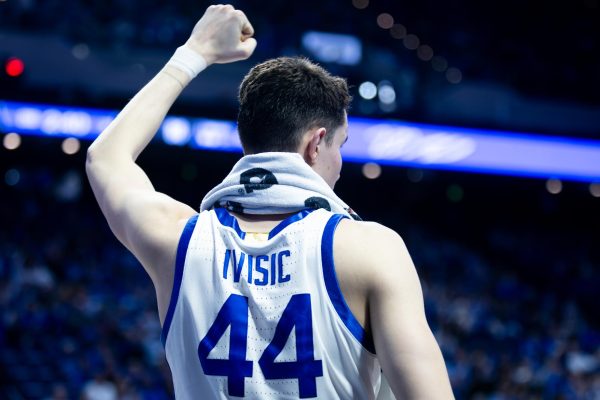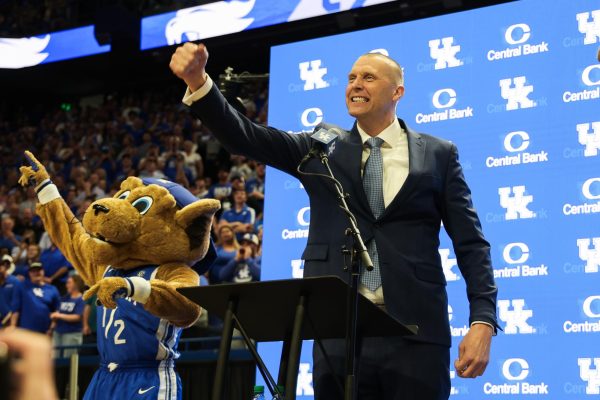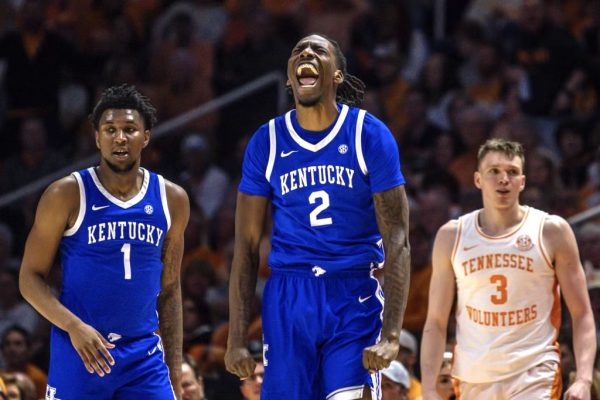Kentucky mens basketball’s history in the SEC Tournament
The Kentucky Wildcats mens basketball team holds up their trophy after the SEC Championship game against the Arkansas Razorbacks on Sunday, March 12, 2017, in Nashville, Tennessee.
March 10, 2022
It’s officially March, and in the world of college basketball that means madness. Before getting to the big dance to end the month, we first have to thin the field in conference tournaments.
Kentucky is no stranger to the SEC Tournament, having been a founding member of the conference since its inception.
The Wildcats famously took home the trophy in the first ever SEC Tournament held in 1933, a time in which the likes of Tulane and now Division-3 Sewanee were part of the conference. Under head coach Adolph Rupp, the Cats defeated Mississippi State 46-27.
That first SEC Championship team was boosted by Forest Sale, whose jersey now hangs in the rafters of Rupp Arena, and who was one of coach Rupp’s first NCAA All-Americans and named the 1932-1933 National Player of the Year.
From that first tournament until it was dropped from 1953-1978, Kentucky won the title 12 more times under Rupp, including a stretch of seven straight, while losing in the championship on three separate occasions.
Rupp continued to dominate the college basketball world with the Wildcats, though he would never make another SEC Tournament Championship part of his résumé as the spectacle didn’t return until his tenure had come to an end.
In the first tournament after the hiatus, in 1979, the Wildcats finished as the runner-up, losing to Tennessee 75-69 in overtime under head coach Joe B. Hall.
Though Kentucky lost the game, it did provide the first ever SEC Tournament MVP in the form of eventual NBA talent and current Transylvania assistant coach Kyle Macy.
The Wildcats would once again fall short in the title game one year later, this time losing by just two points, 80-78, to LSU.
Not making the title game in 1981, Kentucky once again became the runner-up to the title in 1982, with the game being held in UK’s own Rupp Arena. The Wildcats came up short to Alabama 48-46, though they once again produced the MVP, this time in Dirk Minniefield.
Kentucky won its first and only SEC Championship under coach Hall in 1984, out-lasting Auburn 51-49, though the Tigers produced the MVP in the form of NBA legend Charles Barkley.
Two years later, in the first season under new head coach Eddie Sutton, Kentucky won the title, once again beating Alabama 83-72.
Sutton would lead the Cats to victory one more time during his short tenure, winning in 1988 over Georgia.
After the era of Sutton came to an end in the Bluegrass, a new era came to be: the era of Rick Pitino.
In Pitino’s eight seasons at Kentucky, the Wildcats hoisted the SEC Trophy five times, most notably winning the conference four years in a row from 1992-1995.
Kentucky also had four SEC MVPs during Pitino’s tenure with Jamal Mashburn in 1992, Travis Ford winning back-to-back awards in ‘93 and ‘94, Antoine Walker in ‘95 and finally Ron Mercer in ‘97.
After Pitino departed the program, in stepped Tubby Smith, who was able to turn Pitino’s conference championship in his final season into three consecutive SEC titles, winning the trophy in both of his first two seasons.
Smith also coached two SEC MVPs for those titles, with Wayne Turner claiming the award in 1998 and Scott Padgett winning in 1999.
Smith would win three more SEC titles before his tenure came to an end, winning in 2001 behind SEC MVP Tayshaun Prince and winning back-to-back titles in 2003 and 2004, once again producing two more MVPs in the forms of Keith Bogans and Gerald Fitch.
Kentucky came up short in the title game the following year in 2005, getting blown out 70-53 in what was then called the Georgia Dome. Florida would win the title three years in a row, including the 2005 win with the final of the three coming alongside Smith’s departure from Lexington.
Smith was followed by the only Kentucky coach in the conference tournament era to never claim victory: Billy Gillispie.
Gillispie’s two-season tenure did not see Kentucky even make the title game before a new coach was chosen: little known local hero John Calipari.
Calipari returned Kentucky to the promised land in his first season, with the Wildcats winning the 2010 SEC Championship over Mississippi State by one point in overtime with John Wall leading the charge.
Calipari would go back-to-back the following season, blowing out Florida by one point less than the latter had years prior, with Kentucky boasting the MVP once again, this time in Darius Miller.
Kentucky fell short in the championship game to Vanderbilt in 2012, ending its winning streak, though it would go on to claim the National Championship just weeks later.
UK did not make a deep conference run in its infamous NIT losing season in 2013 but returned to the title game the following year, though it would lose to Florida by one point.
After the loss to Florida in 2014, Kentucky won four straight SEC Championships from 2015-2018 with all four wins producing SEC MVPs.
Kentucky has not made the title game since winning four straight, missing out in 2019 and 2021, and never having gotten to play a game in 2020 as the COVID-19 pandemic shut the tournament down after the first round.
Looking overall, Kentucky has won 31 SEC Championships, by far the most of any team, with the closest competition being Alabama with seven.
Even without the 13 pre-1979 wins, Kentucky maintains a double-digit lead on all conference opponents.
Factoring in all conference championship wins, Kentucky can factually say that it holds more conference titles than all other SEC teams combined, with the entire field adding up to 29 championships.
Entering the 2022 SEC Tournament, Kentucky checks in as the No. 3 seed in the conference with a 14-4 conference record and a 25-6 overall record as Calipari seeks his seventh SEC Championship, second to only coach Rupp and most of any Kentucky coach in the post-1979 era.
















































































































































